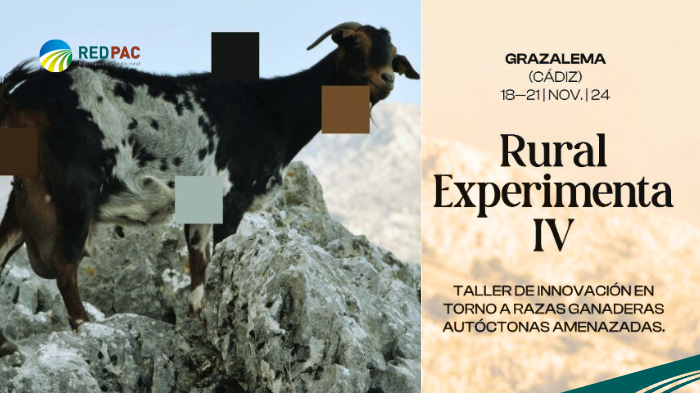
18 de October de 2024
• The Ministry of Culture and the Ministry of Agriculture, Fisheries and Food are promoting the “Innovation Workshop on Endangered Native Livestock Breeds” within the “Rural Experimenta IV” project.
- The Ministry of Culture and the Ministry of Agriculture, Fisheries and Food are promoting the "Innovation Workshop on Endangered Native Livestock Breeds" as part of the "Rural Experimenta IV" project.
- The workshop's objective is to strengthen the role of extensive livestock farming and native livestock breeds through culture, heritage, and creativity, with special attention to new generations.
"To generate a pool of ideas that others can leverage to launch new cultural, heritage, and creative projects centered around extensive livestock farming ." This is the purpose of the 4th edition of " Rural Experimenta " (Grazalema, November 18-22), the Ministry of Culture 's think tank , which each year presents a workshop for the collaborative development of experimental and innovative projects in rural areas. In its 2024 call, and thanks to a joint collaboration between the Ministry of Culture and the Ministry of Agriculture, Fisheries and Food ( MAPA ), Rural Experimenta proposes an “ innovation workshop on threatened native livestock breeds ”, which aims to highlight the role of native livestock breeds - given their high cultural, heritage, social, economic, biological and environmental value and their role in the conservation of ecosystems - in order, from this premise, to become a provider of future ideas and projects that can be applied in the territory and benefit the people who inhabit it.
The workshop will take place over five days in Cádiz, with morning and afternoon sessions. It will focus on three initial lines of work identified by the organizers. These will define three working groups designed to become " pilot projects" that can be replicated and adapted to other territories.
Stake
The workshop will bring together stakeholders from the cultural, scientific, and livestock sectors from across Spain. The workshop methodology is innovation workshops : work spaces where people from diverse sectors, disciplines, and backgrounds, with varying levels of knowledge and experience, will come together to brainstorm and design new proposals, tools, and strategies based on extensive livestock farming and native breeds.
The workshop will feature a team of experts from different sectors across Spain, previously identified by the organizers, who will be joined by a team of collaborators (students and professionals from various fields who have a special interest or connection with the topics of this edition).
Thus, the call for workshop participants is twofold:
- For associations : an officially recognized association of breeders of native breeds is sought to host the workshop.
- For collaborators : students with projects related to extensive livestock farming (degree, master's degree, School of Shepherds, etc.) and professionals from diverse professional fields (cultural managers, livestock farmers, managers and technicians of Local Action Groups and/or local administrations, artists, economists or specialists in communication and marketing, etc.)
Together, they will work on developing ideas for cultural projects linked to the cultural and heritage wealth associated with native livestock breeds, and specifically, the breeds of collaborating associations, and their connection to other areas such as environmental sustainability, biodiversity, rural development, the demographic challenge, and the preservation and transmission of knowledge, particularly to new generations.
Endangered native breeds
Spain is one of the countries with the greatest zoogenetic diversity in Europe, boasting a livestock heritage consisting of 166 native breeds or varieties, 148 of which are endangered . At the same time, the primary sector and livestock farming are one of the main economic and social drivers of rural areas in Spain. The connection between this activity and the development of communities and their surroundings, the preservation of the natural environment and its biodiversity, and territorial identity is a reality that deserves to be recognized.
Specifically, native livestock breeds, characterized by their special adaptation to their environment, are vital to maintaining ecosystems and preserving the livestock sector.











